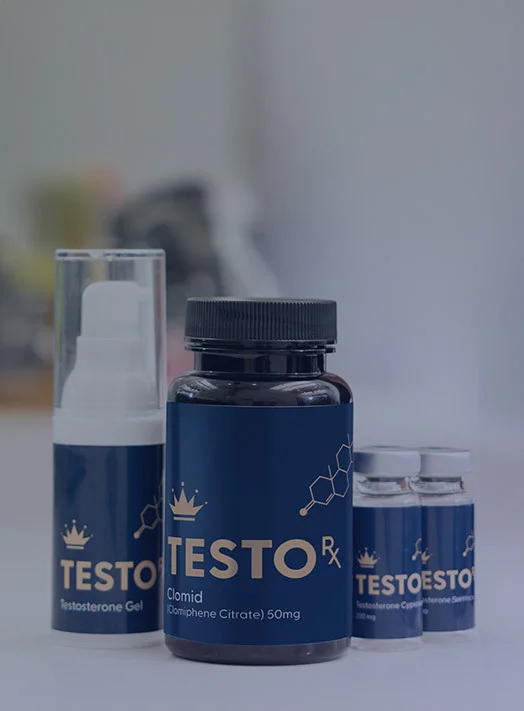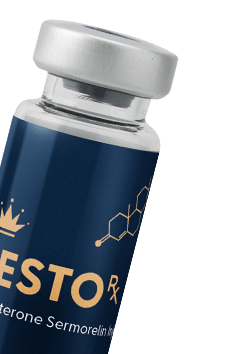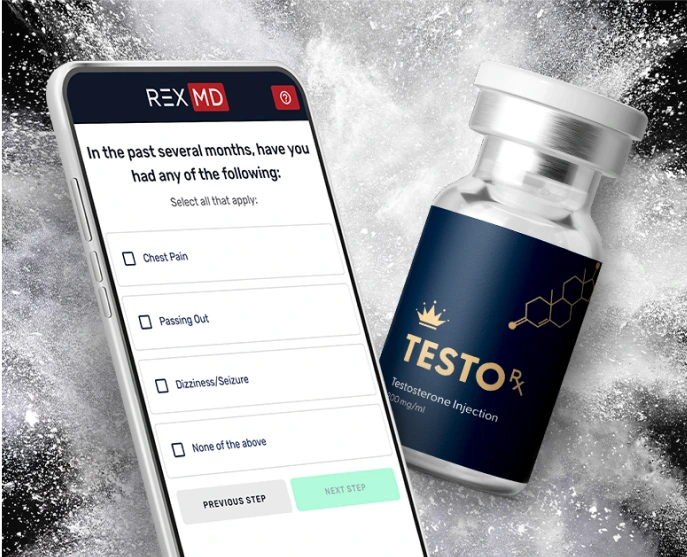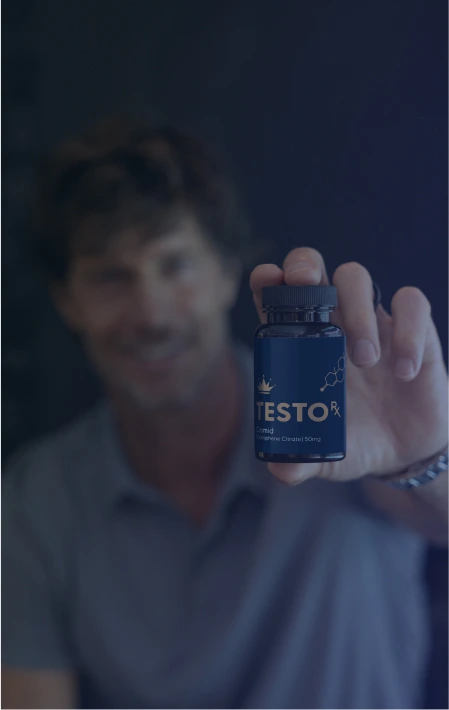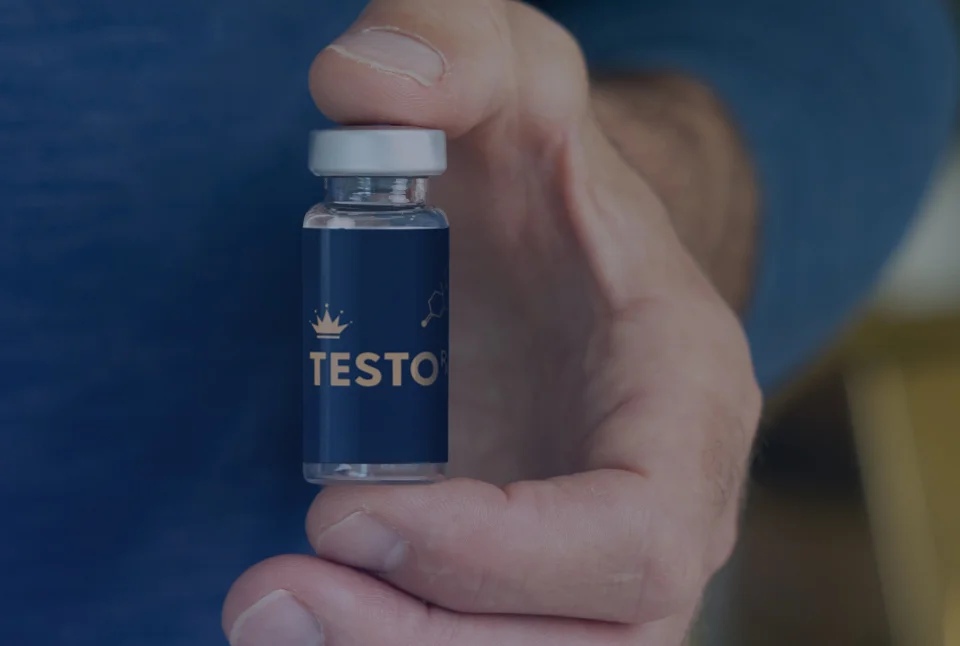Risk and Safety Disclosures
Testosterone Cypionate Injection
Controlled Substance
Testosterone Cypionate Injection contains testosterone, a Schedule III controlled substance in the Controlled Substances Act.
Indications and Usage
Testosterone Cypionate Injection is indicated for replacement therapy in the male in conditions associated with symptoms of deficiency or absence of endogenous testosterone.
1. Primary hypogonadism (congenital or acquired)-testicular failure due to cryptorchidism, bilateral torsion, orchitis, vanishing testis syndrome; or orchidectomy.
2. Hypogonadotropic hypogonadism (congenital or acquired) - gonadotropin or LHRH deficiency, or pituitary-hypothalamic injury from tumors, trauma, or radiation.
Safety and efficacy of Testosterone Cypionate Injection in men with "age-related hypogonadism" (also referred to as "late-onset hypogonadism") have not been established.
Contraindications
- Known hypersensitivity to the drug
- Males with carcinoma of the breast
- Males with known or suspected carcinoma of the prostate gland
- Women who are pregnant.
- Patients with serious cardiac, hepatic or renal disease.
Warnings
Hypercalcemia may occur in immobilized patients. If this occurs, the drug should be discontinued.
Prolonged use of high doses of androgens has been associated with development of hepatic adenomas, hepatocellular carcinoma, and peliosis hepatis —all potentially life-threatening complications.
Geriatric patients treated with androgens may be at an increased risk of developing prostatic hypertrophy and prostatic carcinoma although conclusive evidence to support this concept is lacking.
There have been postmarketing reports of venous thromboembolic events, including deep vein thrombosis (DVT) and pulmonary embolism (PE), in patients using testosterone products, such as testosterone cypionate. Tell your provider if you experience pain, edema, warmth and erythema (skin redness) in the lower extremity or shortness of breath. If a venous thromboembolic event is suspected, discontinue treatment.
Long term clinical safety trials have not been conducted to assess the cardiovascular outcomes of testosterone replacement therapy in men. Some studies, but not all, have reported an increased risk of major adverse cardiovascular events (MACE) in association with use of testosterone replacement therapy in men.
Testosterone has been subject to abuse, typically at doses higher than recommended for the approved indication and in combination with other anabolic androgenic steroids. Anabolic androgenic steroid abuse can lead to serious cardiovascular and psychiatric adverse reactions.
Edema, with or without congestive heart failure, may be a serious complication in patients with pre-existing cardiac, renal or hepatic disease.
Gynecomastia may develop and occasionally persists in patients being treated for hypogonadism.
The preservative benzyl alcohol has been associated with serious adverse events, including the "gasping syndrome", and death in pediatric patients.
This drug has not been shown to be safe and effective for the enhancement of athletic performance. Because of the potential risk of serious adverse health effects, this drug should not be used for such purpose.
General Precautions
Patients with benign prostatic hypertrophy may develop acute urethral obstruction. Priapism (erection lasting longer than 4 hours) or excessive sexual stimulation may develop. Oligospermia (reduced sperm count) may occur after prolonged administration or excessive dosage. If any of these effects appear, the androgen should be stopped and if restarted, a lower dosage should be utilized.
Testosterone cypionate should not be used interchangeably with testosterone propionate because of differences in duration of action.
Testosterone cypionate is not for intravenous use.
Tell your provider about any of the following after use: nausea, vomiting, changes in skin color, ankle swelling, too frequent or persistent erections of the penis.
Carcinogenesis
There are rare reports of hepatocellular carcinoma in patients receiving long-term therapy with androgens in high doses. Withdrawal of the drugs did not lead to regression of the tumors in all cases.
Geriatric patients treated with androgens may be at an increased risk of developing prostatic hypertrophy and prostatic carcinoma although conclusive evidence to support this concept is lacking.
Adverse Reactions
The following adverse reactions in the male have occurred with some androgens:
Endocrine and urogenital: Gynecomastia and excessive frequency and duration of penile erections. Oligospermia may occur at high dosages.
Skin and appendages: Hirsutism, male pattern of baldness, seborrhea, and acne.
Cardiovascular Disorders: myocardial infarction, stroke.
Fluid and electrolyte disturbances: Retention of sodium, chloride, water, potassium, calcium, and inorganic phosphates.
Gastrointestinal: Nausea, cholestatic jaundice, alterations in liver function tests, rarely hepatocellular neoplasms and peliosis hepatis.
Hematologic: Suppression of clotting factors II, V, VII, and X, bleeding in patients on concomitant anticoagulant therapy, and polycythemia.
Nervous system: Increased or decreased libido, headache, anxiety, depression, and generalized paresthesia.
Allergic: Hypersensitivity, including skin manifestations and anaphylactoid reactions.
Vascular disorders: Venous thromboembolism.
Special senses: Rare cases of central serous chorioretinopathy (CSCR).
Miscellaneous: Inflammation and pain at the site of intramuscular injection.
Abuse
Drug abuse is intentional non-therapeutic use of a drug, even once, for its rewarding psychological and physiological effects. Testosterone may be abused by athletes and bodybuilders. There have been reports of misuse by men taking higher doses of legally obtained testosterone than prescribed and continuing testosterone despite adverse events or against medical advice.
Abuse-Related Adverse Reactions
Serious adverse reactions have been reported in individuals who abuse anabolic androgenic steroids and include cardiac arrest, myocardial infarction, hypertrophic cardiomyopathy, congestive heart failure, cerebrovascular accident, hepatotoxicity, and serious psychiatric manifestations, including major depression, mania, paranoia, psychosis, delusions, hallucinations, hostility and aggression.
The following adverse reactions have also been reported in men: transient ischemic attacks, convulsions, hypomania, irritability, dyslipidemias, testicular atrophy, subfertility, and infertility.
Dependence
Physical dependence is characterized by withdrawal symptoms after abrupt drug discontinuation or a significant dose reduction of a drug. Individuals taking supratherapeutic doses of testosterone may experience withdrawal symptoms lasting for weeks or months which include depressed mood, major depression, fatigue, craving, restlessness, irritability, anorexia, insomnia, decreased libido and hypogonadotropic hypogonadism.
Drug dependence in individuals using approved doses of testosterone for approved indications has not been documented.
Testosterone Gel 1.62% CIII
Testosterone Gel 1.62% is a controlled substance, available by prescription, used to treat adult males who have low or no testosterone due to certain medical conditions.
It is not known if Testosterone Gel 1.62% is safe or effective to treat men who have low testosterone due to aging.
It is not known if Testosterone Gel 1.62% is safe or effective in children younger than 18 years old.
Testosterone Gel 1.62% is a controlled substance (CIII) because it contains testosterone that can be a target for people who abuse prescription medicines. Keep it in a safe place to protect it and never give it to anyone else. Selling or giving away this medicine may harm others and is against the law.
Testosterone Gel 1.62% is not meant for use in women.
Risks:
- Testosterone Gel 1.62% can transfer from your body to others, including children and women. This can happen if other people come into contact with the area where the Testosterone Gel 1.62% was applied. Children and women should avoid contact with the unwashed or not covered (unclothed) areas where Testosterone Gel 1.62% has been applied to your skin.
- Early signs and symptoms of puberty have occurred in young children who have come in direct contact with testosterone by touching areas where men have used Testosterone Gel 1.62%.
- To lower the risk of transfer of Testosterone Gel 1.62% from your body to others, you should follow these important instructions:
- Apply Testosterone Gel 1.62% only to your shoulders and upper arms that will be covered by a short-sleeve t-shirt.
- Wash your hands right away with soap and water after applying Testosterone Gel 1.62%.
- After the gel has dried, cover the application area with clothing. Keep the area covered until you have washed the application area well or have showered.
- If you expect to have skin-to-skin contact with another person, first wash the application area well with soap and water.
- If a child or woman touches the area where you have applied Testosterone Gel 1.62%, that area on the child or woman should be washed well with soap and water right away.
- Stop using Testosterone Gel 1.62% and call your healthcare provider right away if you see any signs and symptoms of puberty in a child, or changes in body hair or increased acne in a woman, that may have happened through accidental touching of the area where you have applied Testosterone Gel 1.62%.
Contraindications:
-
Do not use Testosterone Gel 1.62% if you:
- Have breast cancer or have or might have prostate cancer.
- Are pregnant. Testosterone Gel 1.62% may harm your unborn baby. Women who are pregnant should avoid contact with the area of skin where Testosterone Gel 1.62% has been applied.
- Before using Testosterone Gel 1.62%, tell your healthcare provider about all of your medical conditions, including if you have breast cancer; prostate cancer; urinary problems due to enlarged prostate; heart, kidney, or liver problems; or problems breathing while you sleep (sleep apnea).
- Tell your healthcare provider about all the medicines you take, including prescription and over-the-counter medicines, vitamins, and herbal supplements. Especially tell your healthcare provider if you take insulin, medicines that decrease blood clotting (blood thinners), or corticosteroids.
Side Effects:
- Testosterone Gel 1.62% can cause serious side effects, including:
- If you already have an enlargement of your prostate gland, your signs and symptoms can get worse while using Testosterone Gel 1.62% (including changes in urination).
- Possible increased risk of prostate cancer.
- Blood clots in the legs or lungs. Signs and symptoms of a blood clot in your leg can include leg pain, swelling, or redness. Signs and symptoms of a blood clot in your lungs can include difficulty breathing or chest pain.
- Possible increased risk of heart attack or stroke.
- In large doses, Testosterone Gel 1.62% may lower your sperm count.
- Swelling of your ankles, feet, or body, with or without heart failure. This may cause serious problems for people who have heart, kidney, or liver disease.
- Enlarged or painful breasts.
- Having problems breathing while you sleep (sleep apnea).
- The most common side effects of Testosterone Gel 1.62% include increased prostate specific antigen (a test used to screen for prostate cancer), mood swings, high blood pressure, increased red blood cell count, and skin irritation where the gel is applied.
CLOMID® (clomiphene citrate)
Before starting CLOMID®, tell your provider if you have:
- a known hypersensitivity or allergy to clomiphene citrate or any of its ingredients
- a history of liver problems
- uncontrolled thyroid or kidney problems or adrenal dysfunction
- preexisting or family history of high cholesterol
- any organic intracranial lesion such as pituitary tumor.
Common side effects
of CLOMID® are abdominal or pelvic pain/distension, discomfort and bloating, headache, nausea, and vomiting. Blurred vision and other visual symptoms may also occur during or after taking CLOMID®, which may be prolonged or potentially irreversible.
Sermorelin
Before starting Sermorelin, tell your provider if you have:
-Hypothyroidism
-Hyperglycemia
-Hyperlipidemia
-Intracranial lesions
Tell your provider if you take glucocorticoids (certain steroid drugs) as these medications may adversely interact with Sermorelin.
Common side effects:
The most common side effects with Sermorelin (SC) injection include local injection reactions (pain, swelling or redness. Other treatment-related adverse reactions include headache, flushing, dysphagia, dizziness, hyperactivity, somnolence and urticaria. Heart rate/blood pressure changes may occur with inadvertent overdosage.










